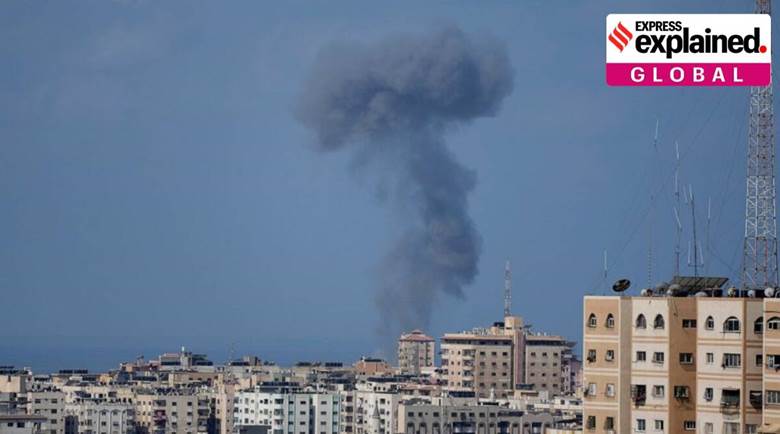





Copyright infringement is not intended
Context: Israel and Palestinian militants in the Gaza Strip were exchanging fire, in the worst bout of cross-border violence since an 11-day war between Israel and Hamas last year.
Background:
|
ISRAEL PALESTINE CONFLICT TIMELINE |
|
|
1799 |
Napoleon offers Palestine as a home to the Jews. |
|
1882 |
Rishon Le Zion, a major Zionist settlement is established in Palestine. |
|
1885 |
The term Zionism is first coined. |
|
1897 |
First Zionist congress is held in Switzerland and first Zionist organization is founded.
|
|
1916 |
Sykes-Picot agreement is signed dividing middle east between French and British. |
|
1917 |
Balfour declaration is created. Britain promises a Jewish national home on Arab land. |
|
1919 |
King-Crane Commission on the future of Palestine. |
|
1922 |
League of Nations gives approval to British promises. |
|
1929 |
Al-Buraq uprising, the first mass protests against increased Jewish migration. |
|
1935 |
Peel Commission recommends partition of Palestine. |
|
1947 |
UN adopts Resolution 181, a partition plan for Palestine into separate Jewish and Arab states which Palestine rejects. |
|
1948 |
The state of Israel is created. |
|
1949 |
First Arab-Israeli war and Israel seizes more land than agreed in armistices. Gaza strip is created. UN establishes UNRWA. |
|
1950 |
Jordan assumes control of the West Bank. |
|
1964 |
Palestine Liberation Organisation (PLO) is formed. |
|
1967 |
6-day war and Israel occupies rest of Palestine including West Bank, Gaza Strip, Golan Heights (Syria), Sinai (Egypt). UNSC calls on Israel to withdraw from these areas. |
|
1978 |
Egypt and Israel sign the Camp David accords |
|
1987 |
First Intifada is launched in occupied Palestine territory. |
|
1991 |
Madrid Peace Conference ends. |
|
1993 |
Oslo Accord Signed. Palestine and Israeli leaders sign a Declaration of Principles in Washington. Here the PLO is recognized by Israel and given some powers in Gaza. The PLO recognizes Israel’s right to exist. Violence is stopped. They agreed on a plan to implement a two-state solution as part of the Oslo Accords, leading to the establishment of the Palestinian Authority (PA). |
|
2000 |
Camp David II Summit where Israel and PLO renew final status negotiations. |
|
2002 |
Israel reoccupies Palestinian cities in West Bank in the wake of 2nd Intifada. |
|
2005 |
Israel agrees to withdraw from Gaza but maintains control of airspace and some imports/exports while restricting some travel. |
|
2008 |
Israel invades Gaza in Operation Cast Lead. |
|
2014 |
50-day conflict over the summer in Operation Protective Edge after more rockets are launched at Israel. Israel invades Gaza again. |
|
2017 |
U.S. announces decision to relocate the U.S. embassy to Jerusalem, recognizing the city as Israel’s capital. |
Key Terms:
India’s Stand On Palestine-Israel Conflict
|
1936 |
Congress working committee sent greetings to Palestine and on 27th September first observed Palestine day. |
|
1939 |
Session of INC adopted a resolution on Palestine and looked forward to the emergence of an Independent democratic state in Palestine in which Jews rights would be protected. India was the member of UN special committee on Palestine. |
|
1974 |
India became the first non – Arab country to recognize the Palestine Liberation Organization (PLO) as the sole and legitimate representative of the Palestine people. |
|
1980 |
GOI announced in Parliament India’s decision to accord full diplomatic recognition to the PLO office in New Delhi. It was after this that Yasser Arafat paid a three day visit to India, during which he described India as an ‘eternal friend’. |
|
1988 |
India recognized Palestine as a state. Indian Government has constructed the Palestine embassy building in New Delhi, as a gift of the people and GOI to the Palestine people. |
|
2014-15 |
India favored UNHRC’s resolution to probe Israel’s human rights violations in Gaza. Despite supporting probe, India abstained from voting against Israel in UNHRC IN 2015. |
|
Until 2017 |
India’s position was that it supported “the Palestinian cause and called for a negotiated solution resulting in a sovereign, independent, viable and united State of Palestine, with East Jerusalem as its capital, living within secure and recognised borders, side by side at peace with Israel”. |
|
2018 |
India de-hyphenated its relationship with Israel and Palestine as part of its West Asia policy to treat both the countries mutually independent and exclusive. |
|
2019 |
India voted in favor of a decision introduced by Israel in the UN Economic and Social Council (ECOSOC) that objected to granting consultative status to a Palestinian non-governmental organization |
|
2020 |
India asked Israel and Palestine to resolve issues between them through direct negotiations and engage with each other to find an acceptable "two-states solution" for peaceful coexistence. |
|
2021 |
At the UNSC meet recently, India reaffirmed its support for Palestine, but stopped short of making any direct reference to the status of Jerusalem or the future Israel-Palestine borders. |
Way Forward:







© 2025 iasgyan. All right reserved